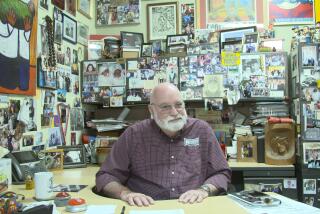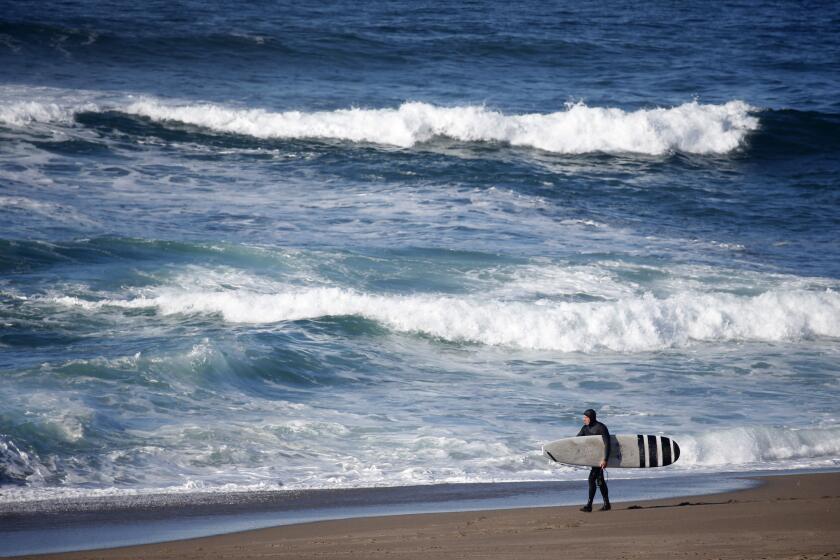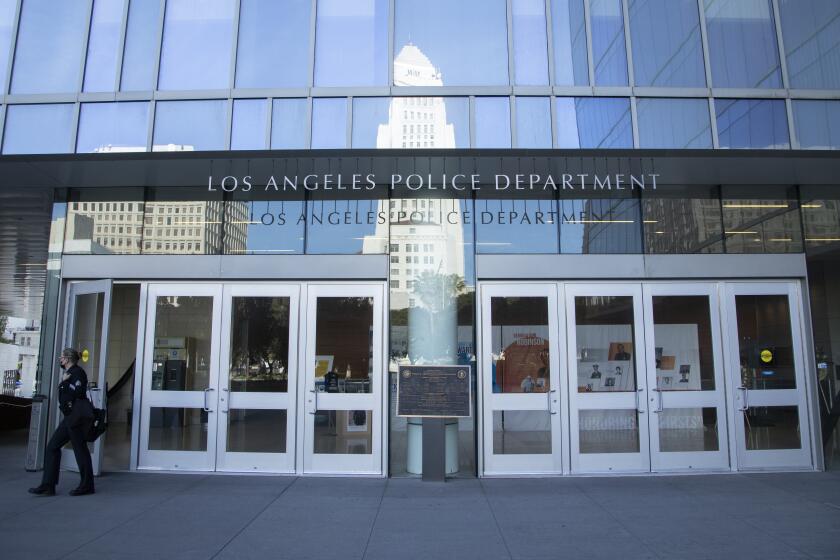Los Angeles says no to Sunset Junction music festival
Bands and DJs were booked, food vendors lined up and thousands of tickets presold.
But Los Angeles officials Wednesday pulled the plug on the Sunset Junction Street Fair, days before one of the city’s oldest and most popular music festivals was scheduled to begin, in a dispute over $260,000 in unpaid fees.
It was the most aggressive stand yet in the city’s effort to get tough on the people and organizations who owe money to cash-strapped City Hall.
The city loses millions of dollars in uncollected debts owed by everyone from community groups to people who don’t pay parking tickets. One report last year showed that a handful of city agencies had collected only 53% of the money owed to them. A citizen commission looking at the same issue called the city’s debt collection “a mess.”
The decision to recoup more costs from special events began two years ago, after the Michael Jackson memorial at Staples Center consumed hundreds of hours of police staffing time. With officials struggling to solve an ongoing budget crisis by eliminating thousands of city jobs, subsidies for such events became politically radioactive.
City officials have been searching for ways to avoid new cuts to parks, libraries and other basic services. And on Wednesday, they drew the line at Sunset Junction, a two-day grassroots event created three decades ago to soothe tensions between Silver Lake’s Latino and gay residents.
Three days before dozens of bands and DJs were to take the stages near Sunset and Santa Monica boulevards, the city’s little-known Board of Public Works refused to issue a permit for the event. In a late-summer cliffhanger, the panel — whose members are appointed by Mayor Antonio Villaraigosa — turned aside tearful pleas from organizers.
Board President Andrea Alarcon had left open the possibility earlier in the week that the permits would be issued if festival organizers showed up with a $141,000 check. That money was needed to cover the cost of police protection, parking enforcement and other city services for this year’s festival — and did not include the $260,000 owed last year.
Organizers scrambled Monday and Tuesday to pull the money together, securing a last-minute $100,000 loan from promoter Live Nation and smaller donations from individual contributors. But when they were unable to deliver a check Wednesday, Alarcon said she had no interest in entertaining their request again.
“Fail me once, shame on you. Fail me twice, shame on me,” she said. “This organization has failed this city time and time again.”
The board’s 4-0 vote threw into chaos an event that draws tens of thousands of visitors and had a lineup of more than 80 acts, including musical trio Hanson and punk favorite Butthole Surfers. Because the council is on summer recess until after the festival, the only option left for Sunset Junction is to seek a court injunction, said Phil Tate, a lawyer for festival organizers.
“This is clearly not how we wanted it to go today,” he said.
Sunset Junction had been steadily growing over the decades, transforming itself from a street festival with music to an outright music celebration charging $25 at the gate. Those changes — and the installation of a fence around sections of Sunset Boulevard — infuriated nearby residents, who contend the event no longer has anything to do with Silver Lake.
“The use of the public property for private profit is what really upsets people,” said Janet Cunningham, who serves on the Silver Lake Neighborhood Council. “That’s our streets, our neighborhood, our stores, our coffee shops we can’t get to so that this big ‘Coachella in the city’ can happen.”
Yet the scene that so disturbed neighbors became a huge hit with music lovers and performers, drawing punk bands, R&B acts, DJs, rappers and country singers. This year’s lineup included k.d. lang, Bobby Womack, the Three Degrees and the group Ozomatli.
“Without Sunset Junction, there’s nothing for the neighborhood to rally around,” said Daniel Norman, singer for the L.A.-based A House for Lions, which was also scheduled to play. Supporters of the festival, he said, “are right in saying that, in a way, the festival created Silver Lake.”
Wednesday’s vote was the culmination of a yearlong dispute between city officials and the Sunset Junction Neighborhood Alliance, the nonprofit that stages the event.
Days before last year’s August festival, Sunset Junction organizer Michael McKinley signed an agreement with the Board of Public Works and the office of Council President Eric Garcetti promising to pay the $260,000 in fees by Sept. 1, 2010. Under his signature, however, he added the words “under protest.”
Since then, Sunset Junction lobbyists have repeatedly disputed how city officials arrived at that amount, which included overtime pay racked up by police officers during last year’s event. Festival lawyer Jerry Neuman questioned whether 144 Los Angeles police officers were really at last year’s event, as stated in the city’s invoice.
On Monday, the board voted 3 to 1 to reject the latest permit application. And on Wednesday, festival organizers told officials they would have a check within 24 hours — and offered a fax from Chase Bank showing that the nonprofit had indeed received the $100,000 loan.
Board members complained that they had been handed a ledger and a promise — not the money needed to deliver city services during the event.
Tate, the Sunset Junction lawyer, implored city officials to give his client enough time to provide a check Thursday morning. And he warned the board that the city would probably never see the $260,000 still owed if the festival is killed. “You’ll be one of many creditors standing in line waiting to get paid … and this organization is probably going to go away,” he said.
Public Works board member Valerie Shaw agreed, predicting that Wednesday’s vote would cause the Sunset Junction Neighborhood Alliance to file for bankruptcy — and the city to lose out on its money. “I see this really as a very sad and tragic situation,” she said.
Councilman Garcetti, whose district includes Silver Lake, was on vacation Wednesday. But spokesman Yusef Robb voiced support for the board’s decision, saying festival organizers had been trying to “flimflam $400,000 from the taxpayers.”
“The fact that they came up with a large sum … in just 36 hours, shreds their credibility even more. They should have spent the last 12 months coming up with the full amount,” he said.
Los Angeles Times staff writer August Brown contributed to this report.
More to Read
Start your day right
Sign up for Essential California for news, features and recommendations from the L.A. Times and beyond in your inbox six days a week.
You may occasionally receive promotional content from the Los Angeles Times.







